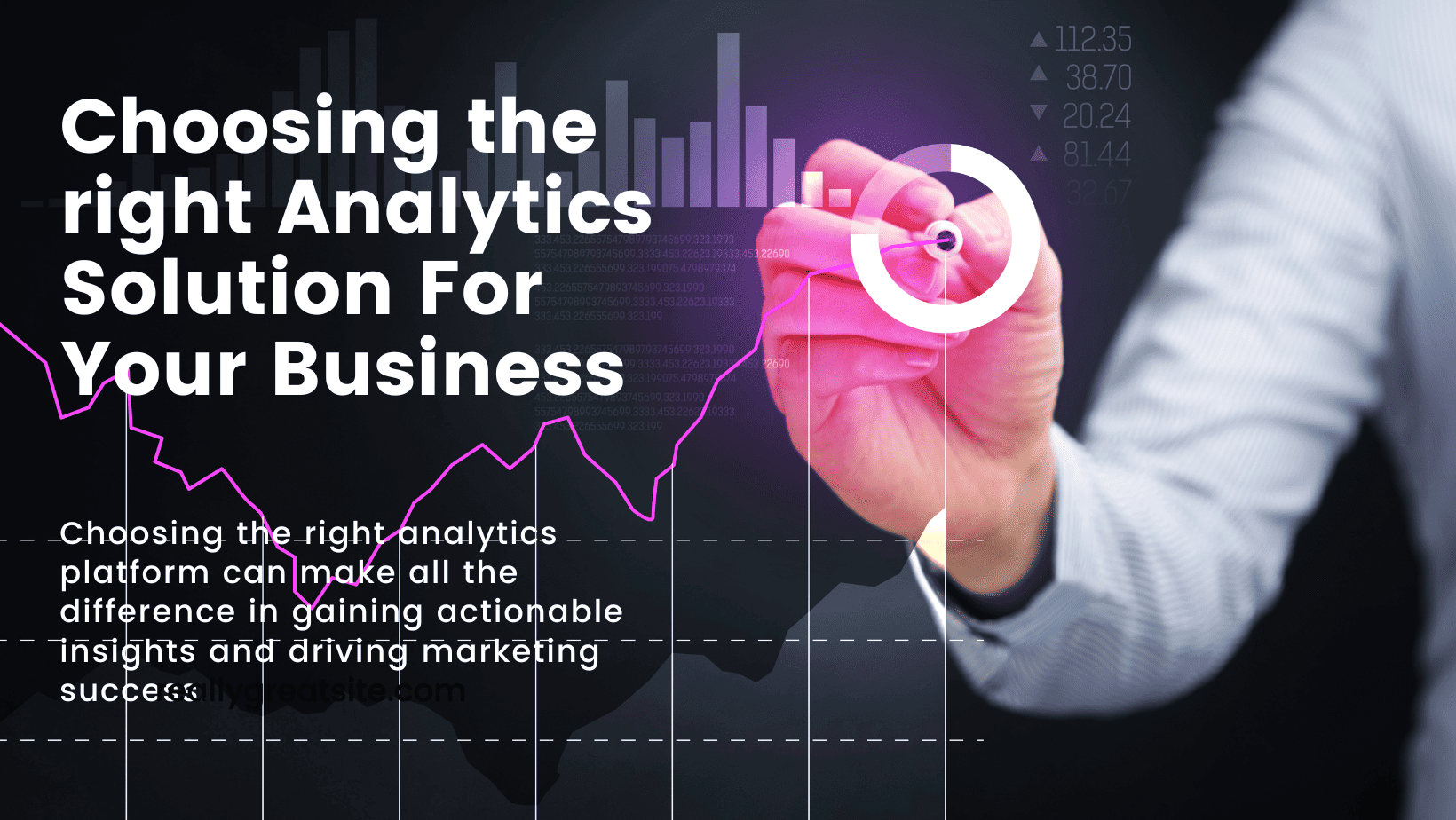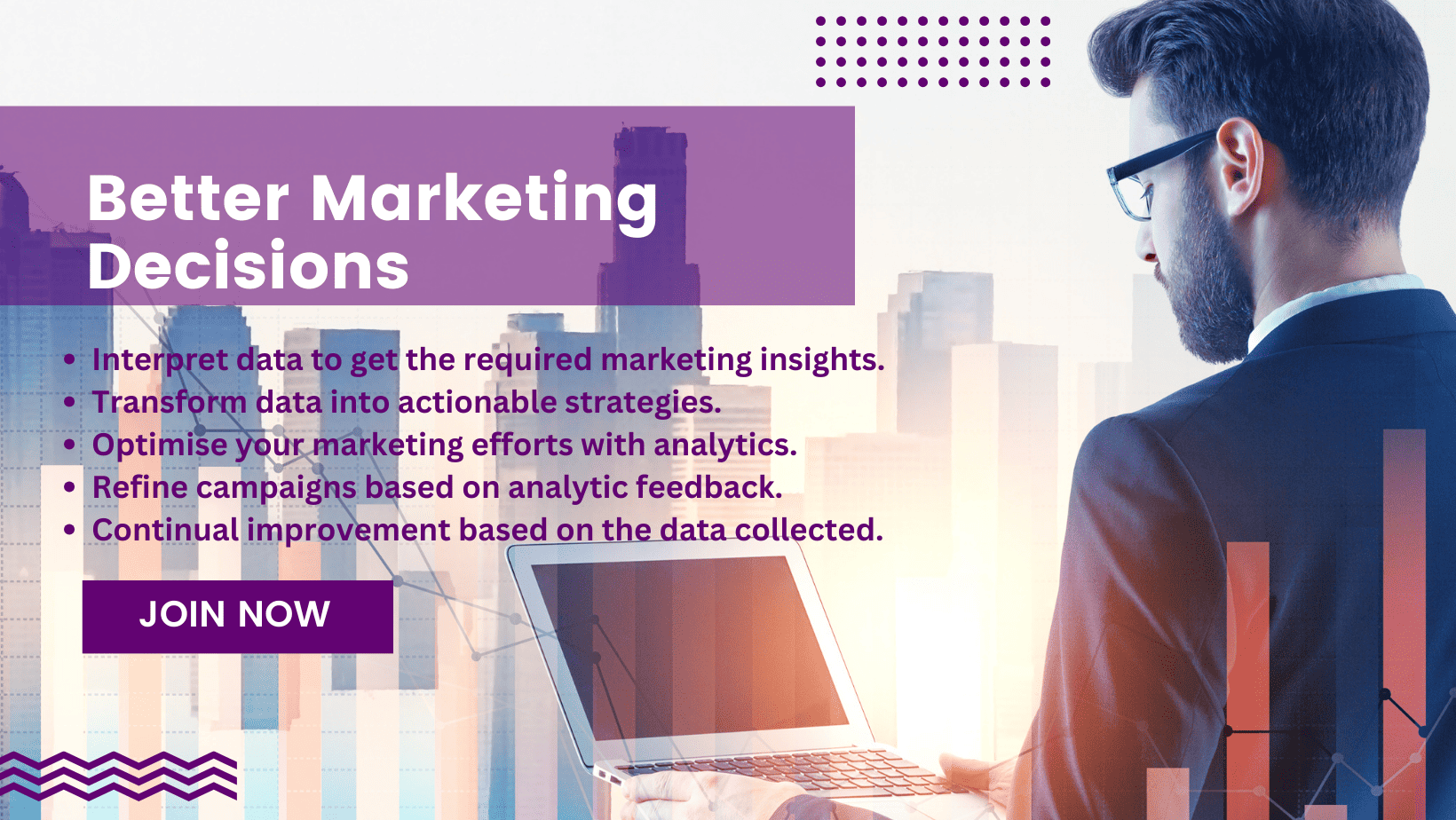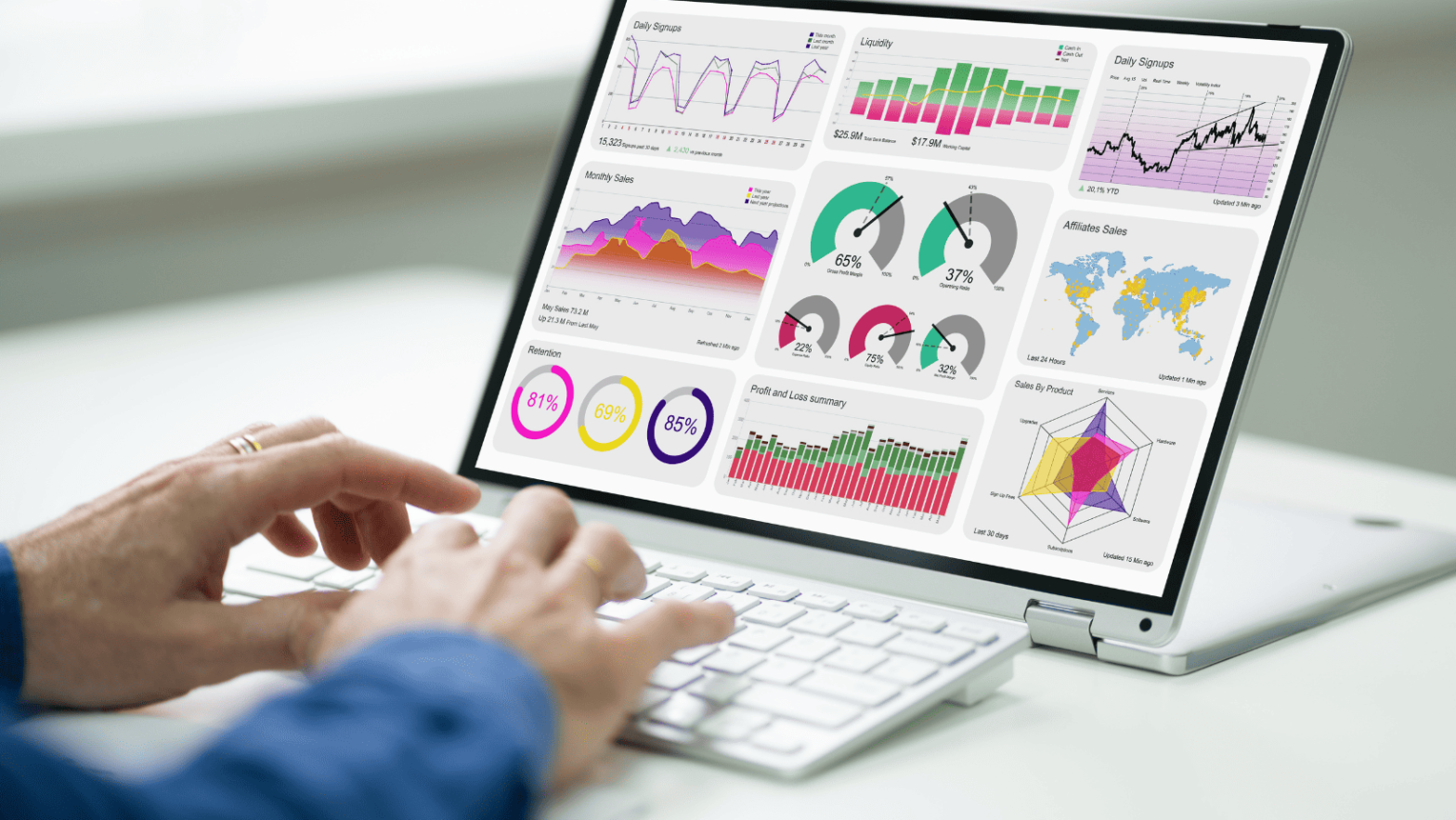When my friend John started his e-commerce business selling socks, he wasn’t sure if the strategy he was implementing in his marketing was the right one until he stumbled upon a blog post about Google Analytics and its importance for any business success.
Discover the powerful impact analytics can have on your marketing strategy. By delving deep into insights derived from data analysis, you can uncover valuable information that will enhance your understanding of consumer behavior and guide your decision-making toward more effective and targeted campaigns.
Navigate through the intricate world of analytics and explore how it can revolutionise the way you approach marketing strategies.
Benefits of using analytics on your website
- Data-driven Decisions: Analytics allows you to make data-driven decisions based on insights rather than assumptions, leading to more effective marketing strategies.
- Targeted Marketing: By analyzing customer data and behavior, you can tailor your marketing efforts to specific segments, increasing the relevance and success of your campaigns.
- Performance Tracking: Analytics tools enable you to track the performance of your marketing campaigns in real-time, allowing you to make timely adjustments for optimal results.
- Improved ROI: Through analytics, you can measure the return on investment of your marketing activities, identifying what works and what doesn’t to allocate resources more effectively.
- Competitive Advantage: Leveraging analytics gives you a competitive edge by understanding market trends, consumer preferences, and your own performance to stay ahead of the competition.

Understanding the Analytics Landscape
The world of analytics is a complex and ever-evolving landscape that offers valuable insights into the performance of your marketing strategies. By understanding the analytics landscape, businesses can make data-driven decisions and optimise their marketing efforts for greater success.
Key Metrics to Monitor
One of the most crucial aspects of navigating the analytics landscape is knowing which metrics to monitor. Metrics like website traffic, conversion rates, bounce rates, and customer acquisition costs can provide valuable insights into the effectiveness of your marketing campaigns. By keeping a close eye on these key metrics, businesses can make informed decisions to drive their marketing strategies.
Moreover, monitoring metrics such as customer lifetime value, click-through rates, and social media engagement can help businesses understand customer behavior and tailor their marketing efforts to meet the needs of their target audience more effectively.

Choosing the Right Analytics tool
An effective analytics platform is crucial for businesses looking to navigate the complex analytics landscape. Choosing the right analytics platform can make all the difference in gaining actionable insights and driving marketing success.
Following are some of the widely used analytics tools by businesses.
Google Analytics, Mixpanel, Kissmetrics, Adobe Analytics, Matomo, Open Web Analytics, Woopra, Hotjar, HubSpot, Chartbeat , SimilarWeb, Ahrefs
Platform flexibility, ease of use, integration capabilities, and customisation options are key factors to consider when choosing an analytics platform. Whether it’s Google Analytics, Adobe Analytics, or any other platform, businesses must invest in a tool that provides accurate data and actionable insights to fuel their marketing strategies.
How to use analytics to get the desired value?
Set up your analytics for success
One of the key aspects of leveraging analytics for your marketing strategy is to ensure that you have set up your analytics tools correctly. This involves defining clear objectives, choosing the right metrics to track, and implementing the necessary tracking codes on your digital platforms. By setting up your analytics infrastructure correctly, you can gather accurate data that will enable you to make smart marketing decisions.
It is also crucial to regularly monitor and analyse the data generated by your analytics tools. This ongoing process allows you to identify areas for improvement, track the performance of your marketing campaigns, and make data-driven decisions to optimise your strategy. Setting up your analytics for success requires a proactive approach and a commitment to leveraging data for strategic insights.
Take quick actions on trends and consumer behavior.
One of the most powerful ways analytics can enhance your marketing strategy is through real-time data analysis. By monitoring data in real-time, you can quickly react to emerging trends, consumer behavior patterns, and changes in the market landscape. This agility allows you to tailor your marketing efforts in response to dynamic conditions and stay ahead of the competition.
Moreover, real-time data enables you to personalise your marketing messages, offers, and content based on immediate insights. This level of customisation can significantly enhance the relevance and effectiveness of your campaigns, ultimately leading to higher engagement and conversion rates.
Consumer behavior is constantly evolving, and the ability to react swiftly to changing preferences and trends is paramount for staying relevant in the market. Real-time data analytics empower marketers to make informed decisions on the fly, ensuring that their strategies are always aligned with the latest consumer insights. By leveraging real-time data, you can tap into valuable opportunities and address potential challenges promptly, driving the success of your marketing efforts.
How to make better marketing decisions with analytics?

Interpret data to get the required marketing insights.
Keep a keen eye on your marketing analytics to uncover valuable insights that can guide your strategic decisions. When interpreting data for marketing insights, look beyond surface-level numbers. Dive deep into the metrics to understand trends, patterns, and correlations that can shed light on consumer behavior and preferences.
By analysing data from various sources such as website traffic, social media engagement, and email campaigns, you can gain a comprehensive view of your audience’s interactions with your brand. This holistic approach to data interpretation enables you to make informed marketing decisions that resonate with your target market.
Transform data into actionable strategies.
Insights gleaned from data are only valuable if they can be translated into actionable strategies. To effectively transform data into actionable marketing strategies, focus on setting clear objectives based on your findings. Identify key performance indicators (KPIs) that align with your business goals and use data to track and measure success.
Utilise data visualisation tools to present complex information in a visually compelling manner, making it easier for stakeholders to grasp key insights and make data-driven decisions. By leveraging analytics to inform your marketing strategies, you can optimise campaigns, enhance customer experiences, and drive business growth.
Make sure the quality of data is top notch to make reliable decisions.Regularly review and update your data analytics techniques to stay ahead of trends and changes in consumer behavior.
Using the information from data analytics, businesses can gain a competitive edge and drive successful marketing campaigns that resonate with their target audience.
Optimise your marketing efforts with analytics.
After implementing analytics into your marketing strategy, the next necessary step is to optimise your efforts based on the valuable insights gained. By doing so, you can maximise the impact of your campaigns and drive better results for your business.
Refine campaigns based on analytic feedback.
Analytics provide a wealth of data on how your marketing campaigns are performing. By closely analysing the information, you can identify patterns, trends, and areas for improvement. For example, you may discover that certain demographics are more responsive to specific messaging or that certain channels are more effective in driving conversions. By refining your campaigns based on this feedback, you can tailor your marketing strategies to better resonate with your target audience and improve overall performance.
Additionally, analytics can help you optimise various elements of your campaigns, such as ad creatives, email subject lines, or website designs. By conducting A/B testing and analysing the results, you can determine which variations yield the best outcomes and make data-driven decisions to enhance your marketing efforts further.
Continual improvement based on the data collected.
Continual improvement is a key principle in leveraging analytics to drive your marketing strategy. By continuously monitoring and analysing the data generated by your campaigns, you can gain valuable insights into consumer behavior, market trends, and the performance of your marketing initiatives. This ongoing process of learning from the numbers allows you to adapt and refine your strategies in real time, based on actual data rather than assumptions.
Improvement through continual learning involves staying agile and responsive to the ever-changing digital marketing landscape. By embracing a culture of experimentation and data-driven decision-making, you can stay ahead of the curve and continuously optimise your marketing efforts for maximum effectiveness.
Conclusion
So, to conclude, the key to a successful marketing strategy lies in harnessing the power of analytics. By leveraging data-driven insights, businesses can make informed decisions leading to targeted campaigns, increased customer engagement, and ultimately higher ROI. Understanding the difference between data, analytics, and insights is crucial in this process. unlock the full potential of analytics and drive your marketing strategy towards success.
FAQs

Q: What is the role of analytics in driving marketing strategy?
A: Analytics plays a crucial role in driving marketing strategy by providing valuable insights into consumer behavior, market trends, and the performance of marketing campaigns. These insights help marketers make data-driven decisions to optimize their strategies for better results.
Q: How can analytics help in understanding consumer behavior?
A: Analytics can track and analyse consumer interactions with a brand, such as website visits, clicks, purchases, and social media engagement. By interpreting this data, marketers can gain a deeper understanding of consumer preferences, interests, and buying patterns.
Q: What are the key benefits of using analytics in marketing strategy?
A: The key benefits of using analytics in marketing strategy include improved targeting, enhanced personalisation, better ROI on marketing campaigns, increased efficiency, and the ability to measure and track performance more accurately.
Q: How can analytics help in optimising marketing campaigns?
A: Analytics can help in optimising marketing campaigns by identifying which channels, messaging, and content are most effective in engaging the target audience. Marketers can use this data to adjust their strategies in real-time for maximum impact.
Q: What are the common tools used for marketing analytics?
A: Common tools used for marketing analytics include Google Analytics, Adobe Analytics, SEMrush, HubSpot, and Hootsuite. These tools provide various features for tracking, measuring, and analyzing marketing data to drive strategy.
Q: How can analytics assist in measuring the success of marketing efforts?
A: Analytics can assist in measuring the success of marketing efforts by providing key performance indicators (KPIs) such as conversion rates, click-through rates, engagement metrics, and return on investment (ROI). Marketers can use these metrics to evaluate the effectiveness of their campaigns.
Q: What are the best practices for incorporating analytics into a marketing strategy?
A: The best practices for incorporating analytics into a marketing strategy include setting clear objectives, defining key metrics to track, regularly analyzing and interpreting data, testing and optimizing campaigns based on insights, and staying updated on the latest trends in marketing analytics.

